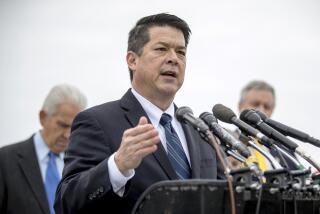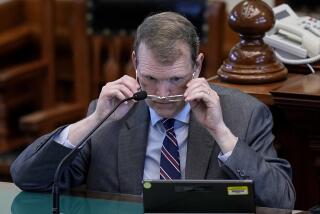Cox, Swindler Had Complex Ties, Documents Show
- Share via
WASHINGTON — Rep. Christopher Cox has portrayed his ties to a securities dealer convicted of fraud as limited to a small amount of legal work. But documents suggest a more complex relationship.
Cox, a Newport Beach Republican, has said William Cooper, sentenced this month to 10 years in prison, was a client of his former law firm, for whom he only prepared a real estate mutual fund in 1985 that was never publicly offered.
For the record:
12:00 a.m. March 4, 1995 For the Record
Los Angeles Times Saturday March 4, 1995 Orange County Edition Part A Page 4 Metro Desk 4 inches; 127 words Type of Material: Correction
Congressman Cox--The Associated Press reported erroneously Feb. 24 that Rep. Christopher Cox (R-Newport Beach) had said he had done a small amount of work for an investment manager convicted of securities fraud. In fact, Cox described his work as extensive but said he had no significant relationship with the manager. The AP story suggested a “more complex relationship,” but the story mentioned only two other ties and did not show either of them to be extensive. In the same story, AP reported that Cox’s former firm was a defendant in a lawsuit similar to those affected by securities legislation he drafted. However, Cox’s legislation would affect securities lawsuits in federal courts. The suit involving the firm was filed in California state court and could not be affected. As a result, the Times headline over the story also mischaracterized the relationship between Cox and the investment manager.
But documents obtained by the Associated Press show Cox also represented Cooper during a 1984 attempt to purchase a bank in Northern California.
At the time, Cooper’s real estate license had been revoked by California regulators on accusations he misused more than $500,000 in mortgage trust funds, records show.
In an interview, Cox said he didn’t recall his own work on the bank deal and didn’t know Cooper’s license had been revoked.
“I don’t have any independent recollection of that work,” Cox said. At the time of the 1991 fund-raiser, he said, he believed Cooper “was still an upstanding member of the community.”
“Obviously, it was extraordinarily bad luck that I ever even shook hands with the guy,” he said.
Cox’s relationship with Cooper has come under increased scrutiny since the congressman sponsored legislation last month that would make it far more difficult to sue lawyers and accountants in investment-fraud cases.
Cox’s former firm is a defendant in such a lawsuit. Cox isn’t a defendant but his work as a securities lawyer is criticized in the suit. After the AP divulged Cox’s role, ethics watchdogs suggested he should have stepped away from the legislation.
The day after the AP questioned Cox about whether he knew Cooper’s license was revoked, the congressman amended his legislation to prevent lawyers and others from being sued if they “genuinely forgot to disclose” important information.
The House Commerce Committee approved Cox’s bill last week. The White House has threatened a veto.
Last month, lawyers representing the defrauded investors informed Cox they were contemplating adding him as a defendant.
Cooper, a Southern California investment manager, pleaded guilty this month to federal fraud charges in the failure of the First Pension fund he helped oversee.
First Pension losses total more than $120 million, and prosecutors said Cooper and two business partners illegally commingled funds to cover losses in risky investments and to enrich themselves.
When Cooper was sentenced earlier this month, U.S. District Judge John G. Davies said Cooper’s extensive fraud scheme dated back to 1983.
Cox has said he helped Cooper design a securities offering in 1985, but the offering never was made.
Cox also asserts he doesn’t remember advising Cooper and Robert Lindley, also convicted in the First Pension case, in their efforts to buy a bank in Hanford, Calif., in 1984.
Phillip K. Maroot, a lawyer who represented the sellers of Citizens National Bank in Hanford, said he recalled communicating with Cox and other attorneys at the Latham & Watkins law firm about the proposed bank sale.
And records on the deal obtained by the AP include an Oct. 12, 1984, letter from Cox to Maroot formalizing the terms in a seven-page document. Two follow-up letters also identified Cox as the point of contact on the proposed deal.
“I may have been sitting in on a meeting where the final terms were discussed,” Cox said. “I really don’t recall having any involvement in that.”
One possible stumbling block to the Citizens National acquisition effort was that Cooper’s real estate license had been suspended in California less than 90 days earlier because regulators found he had misappropriated nearly $600,000 in mortgage trust deeds under his control.
Maroot said he knew nothing about the revocation.
“I don’t think anybody on our side was privy to that at that point in time,” he said. “Mr. Cooper had trouble putting the money together for the deal, but they didn’t tell us anything about his real estate license.”
More to Read
Sign up for Essential California
The most important California stories and recommendations in your inbox every morning.
You may occasionally receive promotional content from the Los Angeles Times.













